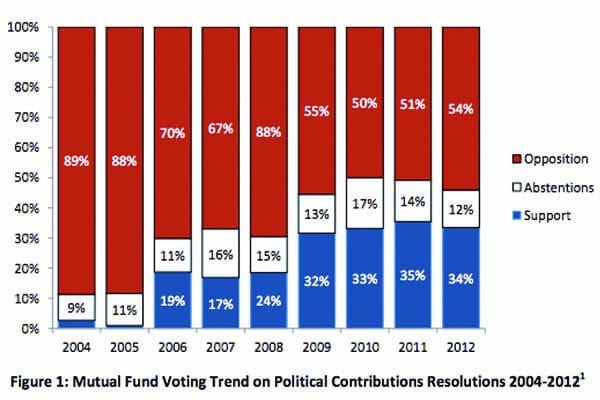Corporate Political Spending Report Could Signal New Trend

source: Center for Political Accountability

The Center for Political Accountability analyzed a study this month revealing a slight decrease in shareholder support for greater transparency regarding corporate political spending. Though support remains just below the all time high of 35 percent, the slight trend reversal could signal a shift in the near decade-long trend.
The study tracks 40 of the largest mutual funds in the United States and their proxy voting record on disclosure regulations for corporate political contributions. When considered as one, the funds represent about $2.7 trillion in securities. When the Center for Political Accountability began looking at this data nine years ago, support for greater disclosure requirements was almost nonexistent amongst big financial names like Morgan Stanley, Wells Fargo, and TIAA-CREF. Of these big names, votes in favor of greater transparency has risen to 88 percent, 82 percent, and 38 percent, respectively. However, the majority of mutual fund families, 54 percent do not favor greater disclosure practices for their companies.

These CPA-modeled resolutions would require corporations to update shareholders semiannually on any new policy resulting in various forms of political spending. This includes monetary and non-monetary contributions given to a candidate or organization intended to “influence the general public, or segments thereof, with respect to elections or referenda.” If such resolutions were adopted they would contain: an itemized listing with the identities of those receiving the contributions, the amount given, and the individual or individuals responsible for the decision.
After reaching a low of 1 percent in 2005, overall support for greater disclosure of corporate political spending increased annually until 2011, dropping one percent this year to 34 percent.
The slight drop compared to last year could be a reaction to greater public scrutiny of corporate campaign contributions, given this year’s record-setting spending. The larger, 9-year trend towards greater transparency is epitomized in TIAA-CREF’s voter guidelines cited in the study:
“Without effective oversight, excessive or poorly managed corporate political spending may pose risks to shareholders, including the risk that corporate political spending may benefit political insiders at the expense of shareholder interests. Given increased public scrutiny of corporate political activities, we believe it is the responsibility of company boards to review and disclose the use of corporate assets to influence the outcomes of elections.”
It’s difficult to tell if the 9-year trend will continue, or if 2012 represents the beginning of a downward spiral for corporate support for transparency in election spending. The one percent dip in 2012 is indicative of receding support from most mutual fund families. However, the 2008 report showed a spike after a two percent drop the year prior.
Looking past the data, many corporations have exhibited sensitivity to the issue of corporate influence in politics. As popular support builds for increased transparency in election donations shareholders seem to be asking similar questions of their board members as well.


